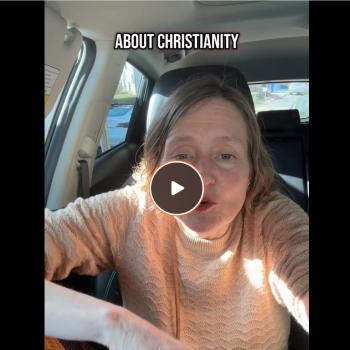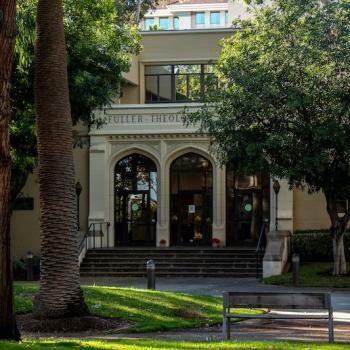Editors' Note: This article is part of the Patheos Public Square on Homeschooling and Public Education. Read other perspectives here.
"Why do you homeschool your kids?"
The answer to this question tends along the lines of, "We want to teach our faith freely. The public schools are rife with problems that we can avoid at home. Besides, we can do as good a job they can."
Faith, fear, and educational advantage—it's a very broad brush, but those are three motivations that lead many parents to choose homeschooling. I'm well-versed in all of them, since they've shaped my own homeschooling experience.
Growing up, I attended public school with nearly everybody else in my small Southern county; we didn't have many other options. By 1991, when I started ninth grade, private schools were scarce in our small town, but homeschooling was a viable option. My parents decided to homeschool my younger sister and me.
My experience was a mixed bag. The local Christian homeschooling group was fairly traditional in its approach to education. They wanted the freedom to incorporate Bible study into their school day, but they also made math and language a priority. My family did the same. As a bookish fourteen-year-old fresh from the bewildering, demoralizing middle school years, I took refuge in homeschooling. I thrived in the relaxed routine of home-based study, among family and friends who accepted me.
However, our larger homeschooling culture pushed a very strong motivation of fear. Public schools were godless, dangerous, and contrary to the true Christian faith. Children who attended public school were indoctrinated, abused, likely to have illicit sex, and eventually would lose their faith. Among these people, educational advantage didn't hold much sway. The important thing was to get the kids out of the public schools and keep them home.
This defensiveness wasn't entirely unjustified. Thirty years ago, homeschooling was questionable both legally and socially. Our country runs on systems—educational, professional, industrial, and even social. Homeschoolers disrupted the homogeneity. They faced intense pressure to conform, and government often intervened to force them back into line.
By the time I came along, most of those battles were over. Homeschooling was legal and much more socially acceptable. But the defensiveness was still there, and the leaders of my particular brand of homeschooling capitalized on that fear for a good profit.
I was still part of this traditional but fearful culture when I got married. My husband, like me, had attended both public school and school at home. When our first child was born, I thought that the only true path for Christian parents was to homeschool. I was afraid to consider any other option.
My mindset shifted gradually. I remember two catalysts in particular.
Two years after we got married, we had two small children and only one vehicle, which my husband took to work every day. I didn't know many people in our new town, and I felt trapped in the house with the kids. I looked ahead to my homeschooling years, and a bleak future stretched out before me. I'd been taught that I shouldn't shirk my responsibility by letting someone else teach my children, but now I pushed back a little. I told my husband that I would homeschool, but only if he promised that it didn't have to be just me for every kid all the way up. He agreed that we'd find other avenues of education if we needed to.
Meanwhile, I got to know our neighbor across the street. She was a special-education teacher in a city public school. I could tell how much she cared about those disadvantaged children. She also planned to send her children through public school. Since she wasn't a neglectful or uninformed parent, I realized that she didn't view the system as inherently destructive to her family. It made me stop and evaluate what I actually saw, rather than what the fearmongers told me to see.
Eventually, my husband and I would come to understand that homeschooling wasn't a foundational tenet of our faith. We switched from schooling under our state's religious exemption option to one that required test scores at the end of each year.
We aren't bound to any certain educational option—yet we still choose to homeschool. Why? For one compelling reason: it's what is best for our children.
Our oldest child suffered from sensory integration disorder from the time she was a baby. She couldn't handle loud noises, crowds, social interaction, and unexpected change. After watching her in gymnastics and a church program, I knew she had trouble functioning in a classroom setting. It made sense that she would start her education in an environment that was familiar and safe—our living room.




